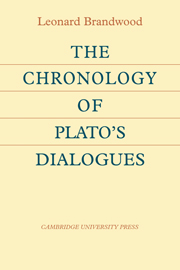Book contents
- Frontmatter
- Contents
- Preface
- 1 Introduction
- 2 L. CAMPBELL
- 3 F. BLASS
- 4 W. DITTENBERGER
- 5 A. FREDERKING
- 6 F. KUGLER
- 7 M. SCHANZ
- 8 E. WALBE
- 9 H. SIEBECK
- 10 C. RITTER (I)
- 11 J. TIEMANN
- 12 G. B. HUSSEY
- 13 H. VON ARNIM (I)
- 14 CH. BARON
- 15 W. LUTOSLAWSKI
- 16 P. NATORP
- 17 G. JANELL
- 18 W. KALUSCHA AND L. BILLIG
- 19 H. VON ARNIM (II)
- 20 C. RITTER (II)
- 21 A. DÍAZ TEJERA
- 22 D. WISHART AND S. V. LEACH
- 23 Conclusion
- Indexes
2 - L. CAMPBELL
Published online by Cambridge University Press: 07 September 2010
- Frontmatter
- Contents
- Preface
- 1 Introduction
- 2 L. CAMPBELL
- 3 F. BLASS
- 4 W. DITTENBERGER
- 5 A. FREDERKING
- 6 F. KUGLER
- 7 M. SCHANZ
- 8 E. WALBE
- 9 H. SIEBECK
- 10 C. RITTER (I)
- 11 J. TIEMANN
- 12 G. B. HUSSEY
- 13 H. VON ARNIM (I)
- 14 CH. BARON
- 15 W. LUTOSLAWSKI
- 16 P. NATORP
- 17 G. JANELL
- 18 W. KALUSCHA AND L. BILLIG
- 19 H. VON ARNIM (II)
- 20 C. RITTER (II)
- 21 A. DÍAZ TEJERA
- 22 D. WISHART AND S. V. LEACH
- 23 Conclusion
- Indexes
Summary
Campbell approached the study of Plato's style with the purpose of determining the date of the two dialogues which he was editing. He had reason to believe that they were later than was generally supposed and with this in mind made the following observations:
Socrates is no longer the chief speaker, and in this respect the Soph. and Pol. resemble the Parm., Tim. and Crit.
The Soph, and Pol. form the middle portion of an unfinished tetralogy, in which they again resemble the Tim. and Crit.
There is a certain didactic tone common to Soph., Pol., Phil, and Laws which is absent from other works like the Phdr. and Rep., where the movement is lighter and more spontaneous.
The natural order of the words is more frequently inverted in these works, the periods more elaborate.
There is a monotonous recurrence of a particular rhythmical cadence, which is also noticeable in certain parts of the Phdr., Rep., Theaet. and the myth of the Prot.
Finally, in the Soph, and Pol. there is a greater fondness for unusual words, poetical and technical, than in any other dialogues except the Phdr., Rep., Tim. and Laws.
It was on this last observation that Campbell based his investigation of the chronology of the dialogues. He had noticed the phenomenon of a technical terminology first of all in the Theaet., then to a greater extent in the Phil., Soph., Pol. and Laws.
- Type
- Chapter
- Information
- The Chronology of Plato's Dialogues , pp. 3 - 8Publisher: Cambridge University PressPrint publication year: 1990



